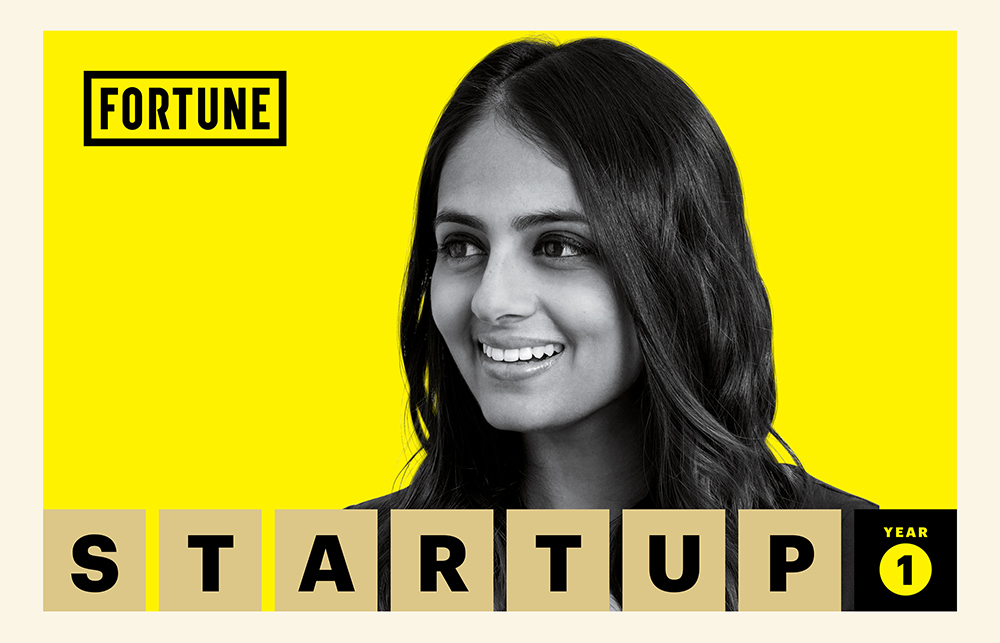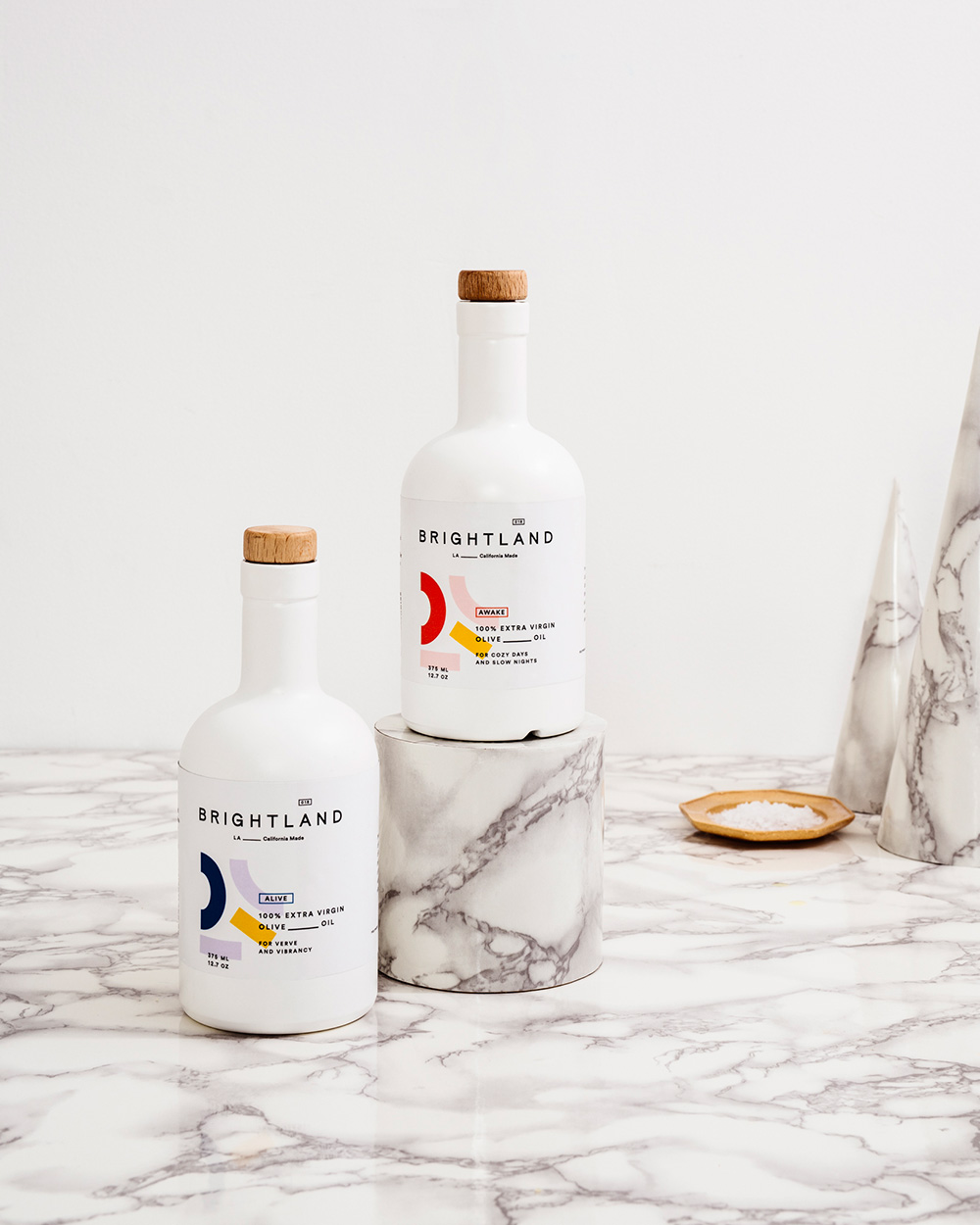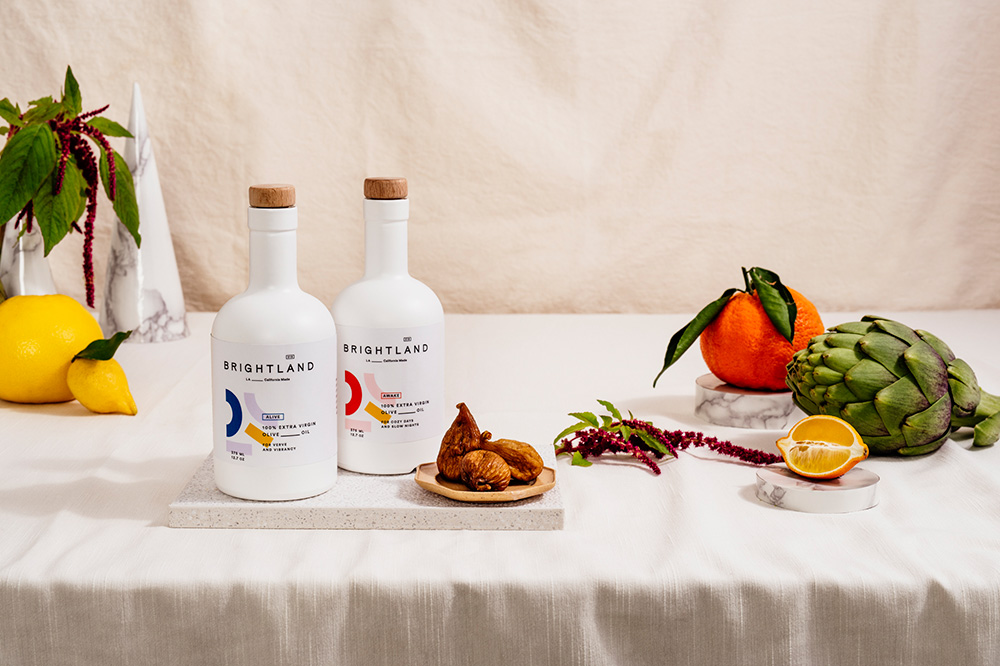
本文屬于《創業第一年》系列特別報道,主要采訪創始人,了解企業運營第一年學到的主要經驗教訓。
20世紀80年代,艾西瓦婭·伊耶和她的家人從印度移民到美國。當時她還只有6個月大,成長階段大部分在休斯頓度過。伊耶說,家里人希望她能成為醫生、工程師或者律師,但她只想走出一條自己的道路。
伊耶曾就讀于紐約大學加勒廷個性化學習學院,職業生涯則開始于巴黎歐萊雅,在蘭蔻品牌任職,后又先后供職于多家風投投資的創業公司,在傳訊與公共事務部門工作。
此后,伊耶創辦了自己的公司——Brightland,專營手工制作的特級初榨橄欖油。
近期,《財富》雜志采訪了伊耶,了解其創業第一年的經營狀況,獲得了什么經驗、克服了哪些困難,還詢問了其對下一年的規劃。
為簡明起見,以下采訪內容有所刪減。
《財富》:橄欖油是廚房必備,但未必每個人都想進入這個行業。與紅酒相似,橄欖油這個行業歷來都是家族企業的天下。是什么促使你創辦了Brightland?它與市場上的其他品牌又有何不同?
伊耶:2014年,我在紐約認識了我的伴侶,有天在家里吃完飯后,我倆就開始一直胃痛,非常難受。經過仔細排除,我們發現罪魁禍首既不是面包,也不是奶酪甚至香料,而是令人意想不到的橄欖油。這促使我做了一些調研,結果發現,由于橄欖油行業缺乏透明度且騙子橫行,美國人食用的橄欖油中有近70%已經腐壞變質。所以,我就下定決心給這樣一個黑心產業帶來一些陽光。
于是,我調轉了職業方向,決定從橄欖油開始,打造一種大膽、優質、可追溯的廚房基本食材解決方案。我把家搬到了洛杉磯,并對加州蓬勃發展的本地橄欖油產業進行了一番研究。
2018年,Brightland正式成立。我們與生產有機產品、合理支付工資并生產新鮮特級初榨橄欖油的家庭農場建立起了合作關系。我們還特別在設計上下了些功夫,打造出了與傳統產品頗不相同的包裝瓶。目前,我們正在開發第一款非橄欖油產品,采用的標準和流程與開發橄欖油產品一樣。我們堅持選用高品質原材料,尋找注重營養價值的農場合作伙伴,使用鮮果,同時也將設計融入我們帶給這個世界的每一件產品中。

作為品牌創始人兼首席執行官,你現在每天的工作和生活是怎樣的?
我們的團隊很小,現在大家都在遠程辦公,幸好可以采用這種工作方式。因為在一些不懂得尊重“邊界”的公司工作過,所以我一早就決定盡可能地不把Slack作為我們的辦公工具,如果有事我們就打電話或者發郵件。
至于日常工作,可能主要就是跟運營主管一起檢查社論和社交媒體上的內容,討論產品路線圖、庫存預測以及時間表,查看盈虧情況和預算,通過社交媒體與客戶直接溝通,和品牌合作伙伴進行電話溝通,檢查新網站的設計和開發編輯。當然,還要在新產品發布前對配方和產品進行測試。
創業第一年你遇到的最大困難有哪些?最讓你意外的是什么?
創業的前12個月,我沒有拿朋友、家人或天使投資一分錢,所以我們在處理創意、營銷、庫存規劃、現金流等工作時都必須嚴控預算。一開始我覺得這可能就是創業中最具挑戰性的部分了,但后來才發現,其實最具挑戰性的事情是調整自己的思維模式。
我必須要放下“稀缺”思維,轉而用“豐富”思維去思考問題,這是一個非常大的轉變,也非常有挑戰性。如果你的身邊,尤其是社交媒體上一直有各種噪音干擾,那么這種思維轉變就會一直是一種挑戰。對創業者而言,保持“豐富”思維非常重要,因為只有這樣你才能做出積極、樂觀且符合自己價值觀的決策。而稀缺思維則會導致短視、恐慌、害怕錯過的想法,進而損害品牌和業務。對于創業者來說,這種思維會讓你感覺筋疲力盡、疲于奔命。
因為疫情尚未得到控制,零售業的前景看起來還會繼續惡化,但雜貨店通常不會受到經濟衰退的影響。不過,對于消費者來說,Brightland更像是一種高端產品,你們是否計劃在近期調整業務布局?
我們是一家“直銷”第一的公司,但同時也有合作的戰略零售合作伙伴。新冠疫情爆發后,我們失去了一些零售合作伙伴的大額采購訂單,但與此同時,直銷渠道的訂單卻出現了大幅增長。因為現在大家在家的時間更多了,做飯也就更頻繁了,所以我們推出了《光明一面》(On the Bright Side)系列視頻,內容包括烹飪節目;與紅酒、奶酪、茶業等行業的專家舉行的問答環節;以及現場水彩繪畫節目等,為大家提供一些積極、舒緩壓力的內容。

與此同時,從產品開發、融資等角度來看,經濟停擺對公司的未來有什么影響?
我們許多內部工作的推進速度因此而減慢了。從某些方面來說,經濟停擺更能讓我們集中注意力,而在其他方面,停擺又降低了整個供應鏈的運轉速度。我們正在開發三款新產品。通常我們的節奏是很快的,但現在取樣、與合作伙伴、農場、供應商的合作以及遠程辦公團隊的溝通聯絡都明顯地減緩了產品的開發速度。
再過一年或幾年,等疫情結束之后,你計劃如何發展Brightland?你希望公司在五年后發展成什么樣子?
企業成長也需要打好基礎。我們正在積極搭建一個交叉環境保護主義框架,覆蓋Brightland從招聘、創意、伙伴關系、編輯、聯盟到整體商業戰略的方方面面。交叉環境保護主義是一種更具包容性的環境保護主義,倡導在保護地球的同時也要保護人類。我們有這種想法是受到了利亞·托馬斯的啟發,她是一名交叉環境保護主義活動家,也是她創造了“交叉環境保護主義”這個詞。
我們也一直在倡導回歸生活的理念。毫無疑問,現代人太過沉迷于手機。所以我們一直鼓勵客戶和社區退后一步,放下手機到廚房里做做飯,去享受簡單愜意的居家生活。(財富中文網)
譯者:Feb
本文屬于《創業第一年》系列特別報道,主要采訪創始人,了解企業運營第一年學到的主要經驗教訓。
20世紀80年代,艾西瓦婭·伊耶和她的家人從印度移民到美國。當時她還只有6個月大,成長階段大部分在休斯頓度過。伊耶說,家里人希望她能成為醫生、工程師或者律師,但她只想走出一條自己的道路。
伊耶曾就讀于紐約大學加勒廷個性化學習學院,職業生涯則開始于巴黎歐萊雅,在蘭蔻品牌任職,后又先后供職于多家風投投資的創業公司,在傳訊與公共事務部門工作。
此后,伊耶創辦了自己的公司——Brightland,專營手工制作的特級初榨橄欖油。
近期,《財富》雜志采訪了伊耶,了解其創業第一年的經營狀況,獲得了什么經驗、克服了哪些困難,還詢問了其對下一年的規劃。
為簡明起見,以下采訪內容有所刪減。
《財富》:橄欖油是廚房必備,但未必每個人都想進入這個行業。與紅酒相似,橄欖油這個行業歷來都是家族企業的天下。是什么促使你創辦了Brightland?它與市場上的其他品牌又有何不同?
伊耶:2014年,我在紐約認識了我的伴侶,有天在家里吃完飯后,我倆就開始一直胃痛,非常難受。經過仔細排除,我們發現罪魁禍首既不是面包,也不是奶酪甚至香料,而是令人意想不到的橄欖油。這促使我做了一些調研,結果發現,由于橄欖油行業缺乏透明度且騙子橫行,美國人食用的橄欖油中有近70%已經腐壞變質。所以,我就下定決心給這樣一個黑心產業帶來一些陽光。
于是,我調轉了職業方向,決定從橄欖油開始,打造一種大膽、優質、可追溯的廚房基本食材解決方案。我把家搬到了洛杉磯,并對加州蓬勃發展的本地橄欖油產業進行了一番研究。
2018年,Brightland正式成立。我們與生產有機產品、合理支付工資并生產新鮮特級初榨橄欖油的家庭農場建立起了合作關系。我們還特別在設計上下了些功夫,打造出了與傳統產品頗不相同的包裝瓶。目前,我們正在開發第一款非橄欖油產品,采用的標準和流程與開發橄欖油產品一樣。我們堅持選用高品質原材料,尋找注重營養價值的農場合作伙伴,使用鮮果,同時也將設計融入我們帶給這個世界的每一件產品中。
作為品牌創始人兼首席執行官,你現在每天的工作和生活是怎樣的?
我們的團隊很小,現在大家都在遠程辦公,幸好可以采用這種工作方式。因為在一些不懂得尊重“邊界”的公司工作過,所以我一早就決定盡可能地不把Slack作為我們的辦公工具,如果有事我們就打電話或者發郵件。
至于日常工作,可能主要就是跟運營主管一起檢查社論和社交媒體上的內容,討論產品路線圖、庫存預測以及時間表,查看盈虧情況和預算,通過社交媒體與客戶直接溝通,和品牌合作伙伴進行電話溝通,檢查新網站的設計和開發編輯。當然,還要在新產品發布前對配方和產品進行測試。
創業第一年你遇到的最大困難有哪些?最讓你意外的是什么?
創業的前12個月,我沒有拿朋友、家人或天使投資一分錢,所以我們在處理創意、營銷、庫存規劃、現金流等工作時都必須嚴控預算。一開始我覺得這可能就是創業中最具挑戰性的部分了,但后來才發現,其實最具挑戰性的事情是調整自己的思維模式。
我必須要放下“稀缺”思維,轉而用“豐富”思維去思考問題,這是一個非常大的轉變,也非常有挑戰性。如果你的身邊,尤其是社交媒體上一直有各種噪音干擾,那么這種思維轉變就會一直是一種挑戰。對創業者而言,保持“豐富”思維非常重要,因為只有這樣你才能做出積極、樂觀且符合自己價值觀的決策。而稀缺思維則會導致短視、恐慌、害怕錯過的想法,進而損害品牌和業務。對于創業者來說,這種思維會讓你感覺筋疲力盡、疲于奔命。
因為疫情尚未得到控制,零售業的前景看起來還會繼續惡化,但雜貨店通常不會受到經濟衰退的影響。不過,對于消費者來說,Brightland更像是一種高端產品,你們是否計劃在近期調整業務布局?
我們是一家“直銷”第一的公司,但同時也有合作的戰略零售合作伙伴。新冠疫情爆發后,我們失去了一些零售合作伙伴的大額采購訂單,但與此同時,直銷渠道的訂單卻出現了大幅增長。因為現在大家在家的時間更多了,做飯也就更頻繁了,所以我們推出了《光明一面》(On the Bright Side)系列視頻,內容包括烹飪節目;與紅酒、奶酪、茶業等行業的專家舉行的問答環節;以及現場水彩繪畫節目等,為大家提供一些積極、舒緩壓力的內容。
與此同時,從產品開發、融資等角度來看,經濟停擺對公司的未來有什么影響?
我們許多內部工作的推進速度因此而減慢了。從某些方面來說,經濟停擺更能讓我們集中注意力,而在其他方面,停擺又降低了整個供應鏈的運轉速度。我們正在開發三款新產品。通常我們的節奏是很快的,但現在取樣、與合作伙伴、農場、供應商的合作以及遠程辦公團隊的溝通聯絡都明顯地減緩了產品的開發速度。
再過一年或幾年,等疫情結束之后,你計劃如何發展Brightland?你希望公司在五年后發展成什么樣子?
企業成長也需要打好基礎。我們正在積極搭建一個交叉環境保護主義框架,覆蓋Brightland從招聘、創意、伙伴關系、編輯、聯盟到整體商業戰略的方方面面。交叉環境保護主義是一種更具包容性的環境保護主義,倡導在保護地球的同時也要保護人類。我們有這種想法是受到了利亞·托馬斯的啟發,她是一名交叉環境保護主義活動家,也是她創造了“交叉環境保護主義”這個詞。
我們也一直在倡導回歸生活的理念。毫無疑問,現代人太過沉迷于手機。所以我們一直鼓勵客戶和社區退后一步,放下手機到廚房里做做飯,去享受簡單愜意的居家生活。(財富中文網)
譯者:Feb
This is an installment in a special series, Startup Year One, interviewing startup founders about the major lessons they learned in the immediate aftermath of their business’s first year of operation.
Aishwarya Iyer and her family emigrated from India to the U.S. when she was just 6 months old in the 1980s, and she grew up mostly in Houston. Iyer says she was expected to become a doctor, engineer, or a lawyer—but she was intent on breaking molds.
Iyer attended New York University, studying at the Gallatin School of Individualized Study. She started her career at L’Oréal, under the Lanc?me brand, and has worked at a number of venture-backed startups in communications and public affairs.
Iyer has since launched her own company, Brightland, a handcrafted extra virgin olive oil brand.
Fortune recently spoke with Iyer to learn more about the startup's first year in business, the lessons learned, the hurdles overcome, and plans for the next year.
The following interview has been condensed and lightly edited for clarity.
Fortune: Olive oil is one of those kitchen staples that virtually everyone has, but it's not necessarily a business everyone can get into. Much like wine, it has a history of being associated with family-owned producers. What inspired the launch of Brightland? And how does it stand apart from what else is already on the market?
Iyer: When I met my partner in New York City in 2014 and started cooking meals at home, we both found ourselves left with consistent, uncomfortable stomach pain. After cutting out the obvious culprits like bread, cheese, even spices, the only constant left was olive oil. The discovery inspired some research where I quickly discovered that nearly 70% of olive oil Americans consume is already rotten or rancid due to a fraud-ridden industry with little to no transparency. I was determined to shine light on the dark industry.
So I pivoted careers and set out to create a bold, elevated, and traceable solution to pantry staples, beginning with olive oil. I moved to Los Angeles, and researched the domestic olive oil industry that is burgeoning here in California.
Brightland officially launched in 2018. We partner with family farms that practice organic practices, pay fair wages, and are crafting fresh extra virgin olive oil. We also made a conscious decision to focus on design; our bottles do not look like traditional olive oils. Now we are in the process of launching our first category outside of olive oil, and we are applying the same framework around sourcing, finding the right nutrient-dense farm partner, using fresh fruit, and incorporating design into everything we put out into the world.
As founder and CEO of your own brand, what does an average day look like for you?
We are a very small team, and right now we are all fortunate to be able to be remote working from our homes. We do not have Slack, by design, and it is a decision I made early on, after working at companies that clearly did not understand boundaries. I decided that I would hold off on implementing Slack as a workplace tool for as long as possible. So we pick up the phone and call each other, or we send emails.
A typical day could be reviewing editorial and social content, discussing product road maps, inventory projections, and timelines with our operations lead, looking at our [profit and loss] and budgets, DM-ing with customers on social, jumping on calls with brand partners, reviewing new site design and dev edits, and of course, recipe and product testing before we are about to launch something new.
What were some of the biggest hurdles you faced in the first year of business? What surprised you the most?
I bootstrapped the company for the first 12 months and did not take any outside capital—zero friends and family, angels, etc.—so we had to be incredibly scrappy with everything from creative and marketing to inventory planning and cash flow. I thought that would be the most challenging part of the business, but it was actually my mind.
I had to stop thinking from a “scarcity” mindset to an “abundance” mindset, and that was a huge shift that was quite challenging—and continues to be challenging when you’re surrounded by the incessant noise, especially on social media. It’s incredibly important for an entrepreneur to live in the abundance mindset, because that is when you can make decisions that are positive, optimistic, and fit your values. Operating from a place of scarcity leads to short-term, panicked, FOMO thinking, and decision making that ultimately hurts the brand and business. It’s exhausting for the entrepreneur to be coming from that place.
As the pandemic continues, the outlook for retail is only looking more dire, but grocery is typically recession-proof space. Still, Brightland might be regarded as more of a premium product for consumers. Does Brightland plan to adjust its business plan for the immediate future?
We have always been a [direct-to-consumer]-first business with strategic retail partners who we work with. When COVID started, we lost some large [purchase orders] from a few retail partners, but we saw a spike on our DTC channel. Since people are at home and cooking more, we introduced a digital content series called "On the Bright Side," where we have been hosting cooking episodes, Q&As with experts in wine, cheese, tea, etc., and live watercolor paintings, to serve as a place for some positivity and calming content.
At the same time, how has the economic shutdown affected the future of the business, from product development to raising capital?
The shutdown has slowed things down for us internally. In some ways, it has allowed us to truly focus, and in other ways, everything in our supply chain is slower. We are working on three new products right now. Getting samples, working with our partners, farms, and vendors, and liaising as a remote team have definitely slowed down the usual sprinting process.
Looking beyond the post-pandemic era, which could be anywhere from a year to a few years from now, how do you plan to grow Brightland and what do you want the business to look like five years from now?
Before we become a larger organization, we want to set some foundations. We are actively building an intersectional environmentalism framework that will apply to all Brightland hiring, creative, partnerships, editorial, alliance and overall business strategy. Intersectional environmentalism is an inclusive version of environmentalism that advocates for both the protection of people and the planet. We have been so inspired by the work of Leah Thomas, an intersectional environmental activist who officially coined the term.
We have also been championing the concept of analog versus digital. I firmly believe that we are all way too addicted to our phones. So as a brand, we always encourage our customers and community to take a step back, spend time in their kitchens without devices, and savor simple, everyday moments at home.






